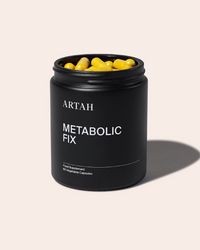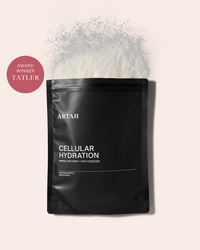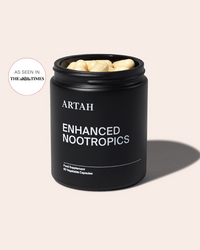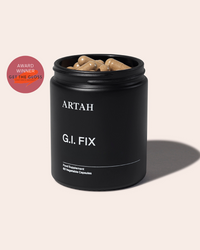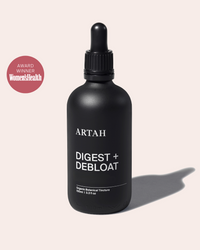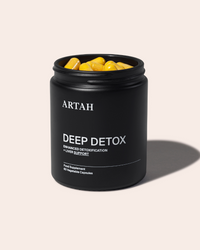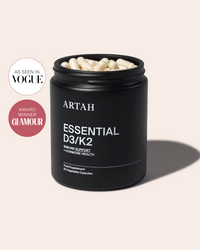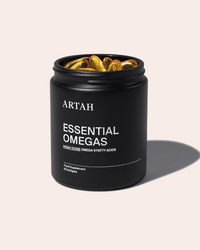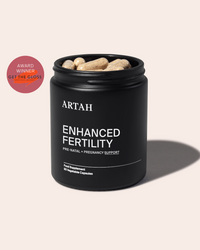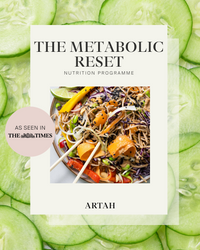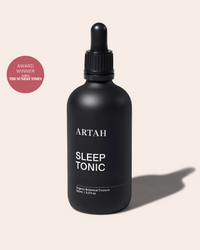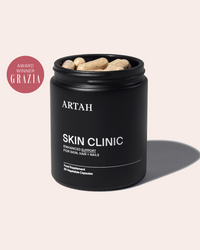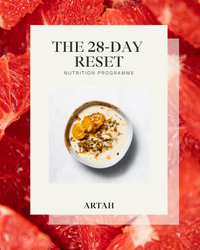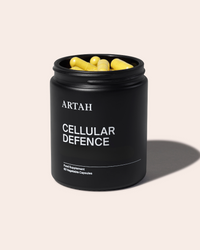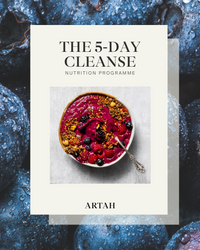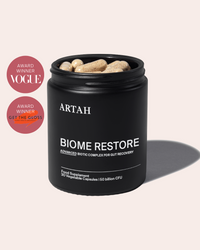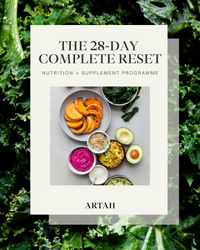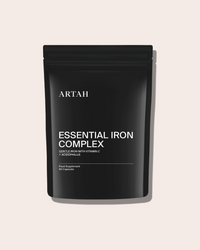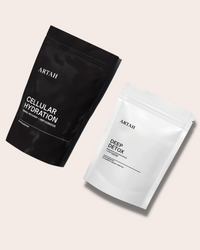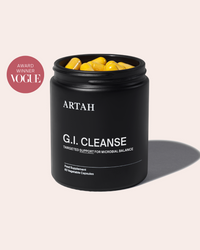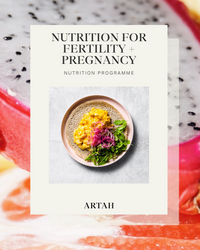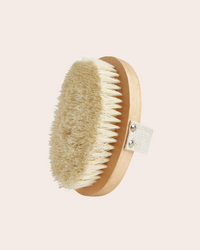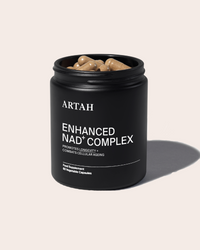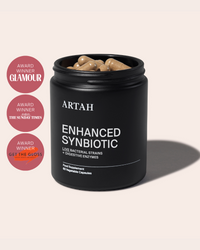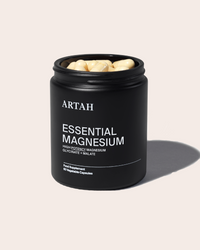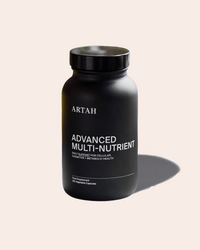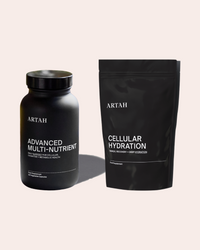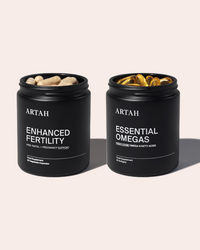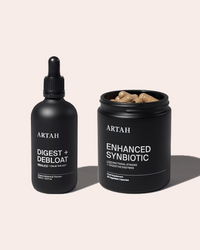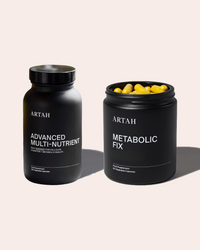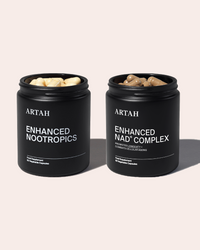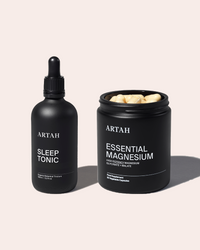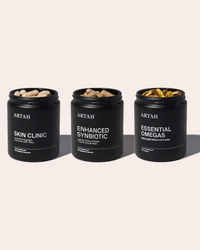5 Foods + Herbs We Swear By For Mental Health
The food we eat has a profound influence on how we feel; some foods can make us feel calm, steady, and happy, whilst others will leave us inflamed, stressed, and low. If you are experiencing stress, fatigue, overwhelm, low energy, or feelings of anxiety, you’re far from alone: one-quarter of people in the UK report experiencing a mental health related problem each year, according to Mind charity (1). The bad news is that there’s not enough mainstream focus on the foods and practices we can incorporate into our regime that can fuel a healthy emotional state. The good news is that there are some simple foods and herbs you can include in your regime to improve your emotional wellbeing today. Here are some of our favourites.
Start with foods and herbs that have anti-inflammatory effects, says Felice Jacka, pioneer of nutritional psychiatry at The Food and Mood Centre and author of Brain Changer. The regular consumption of anti-inflammatory foods, such as, omega-3 rich oily fish has been shown to reduce the risk of common mental health disorders, like anxiety and depression. (2)
Omega-3 Fatty Acids:
Fish oil is a primary source of two important omega-3 fatty acids, EPA and DHA, which can also be found in lesser amounts in good quality red meat. Diets rich in fish are associated with a lower occurrence of depressive symptoms and clinical depression. (3) Depression and anxiety are associated with increased low-grade inflammation in the body, and omega-3 can dampen these inflammatory responses (3). Additionally, omega-3 plays a crucial role in maintaining the health of brain cells and influencing their communication. (4) “Specifically, DHA, a type of omega-3, impacts neural systems using dopamine and serotonin,” says Nutritionist, Laura Jennings. By supplementing omega-3, there's potential to enhance the communication of these neurotransmitters, which are linked to mood, anxiety, and attention. (4)
Since our bodies can't produce omega-3 fatty acids on their own, it's crucial to obtain them through our diet. However, some individuals, such as those following vegetarian or vegan diets, or those who simply don't enjoy the taste of fish, may find it challenging to meet their omega-3 requirements. Global studies have revealed that the regions with optimal EPA and DHA levels include the Sea of Japan, Scandinavia, and areas with indigenous populations or populations not fully adapted to Westernized food habits, whilst areas with very low blood levels were observed in North America, Central and South America, the UK, the Middle East, Southeast Asia, and Africa. (16)
- How to get it from food: Increase SMASH fish consumption – sardines, mackerel, anchovies, salmon, herring. Pro tip: add anchovies to your favourite stews, bolognaise or bakes for added omegas and a great depth of flavour.
- How to get it from supplements: Try Essential Omegas.
Turmeric:
Consider this: the secret to achieving a balanced mental state might just be hiding in our spice racks, masquerading as turmeric. According to experts this golden spice not only enhances the flavour of our food and drinks but also harbours potential benefits for our mental health. Turmeric is a member of the ginger family, has been used for centuries in Ayurvedic medicine to address various conditions. Its vibrant yellow colour comes from curcumin, the main active ingredient. Renowned for its potent anti-inflammatory and antioxidant properties, curcumin plays a pivotal role in influencing factors related to mood. (5) Recent research has made the connection between long-term inflammation and conditions, such as, depression. Curcumin's qualities help combat this chronic inflammation and increase the brain’s adaptability to stress. (6)
- How to get it from food: try adding fresh turmeric to smoothies, shakes and stews.
- How to get it from supplements: try Deep Detox, which also feature anti-inflammatory Milk Thistle.
Cacao:
While chocolate often carries a stigma of being high in calories, laden with sugar and detrimental to health, raw cacao has clear health benefits (and thankfully, can be just as delicious). This unprocessed version of chocolate contains mood boosting minerals like Magnesium, zinc and potassium, and potent polyphenols that elevate it from a sugary snack to a healthful mood booster.
Packed flavonoids, a type of polyphenol, cacao boasts remarkable anti-inflammatory and antioxidant properties. These qualities not only contribute to a healthier body but also play a crucial role in alleviating depressive behaviours and fostering a positive mood. (7) The Magnesium content in cacao powder adds another layer of health benefits. Functioning as a natural GABA enhancer, Magnesium aids in muscle relaxation, paving the way for a more restful sleep experience. (8) When consumed in doses ranging from 50-100g, cacao powder serves as a natural supplement for essential trace minerals like copper, iron, potassium, and zinc. These trace elements play a crucial role in regulating neurotransmitter signalling, and their supplementation has been shown to significantly enhance mental health. (10)
- How to get it from food: look for raw cacao (not cocoa) and add it to your favourite smoothie or dessert in place of cocoa.
Passionflower:
Passionflower is one of the most popular herbal medicines to support sleep, mood, and reduce anxiety. Celebrated for its potential to induce calmness and act as a sedative, this medicinal plant has gained recognition for its remarkable impact on stress reduction. A recent study by Sleep Science Journal found that Passionflower enhances deep sleep by extending the duration of slow wave sleep, a crucial phase for our restorative processes and emotional regulation. (11) Jennings explains that passionflower works by influencing the GABA system, primarily through its active component, flavonoids. These flavonoids enhance GABA receptors in the brain, which leads to anti-anxiety and sleep-inducing qualities. (12)
- How to get it from food: Passiflora can be found as a herbal tea
- How to get it from supplements: Sleep Tonic, which can be used to help with sleep onset and duration, but also as a tonic for mood. Simply reduce the dose to 1 pipette if using in the day.
Lion’s Mane:
Over the last decade, research has been highlighting the noteworthy potential of medicinal mushrooms. Nootropics are rapidly gaining popularity, with one specific mushroom, Hericium erinaceus – or Lion's Mane, garnering considerable interest for its benefits to brain health. Research published in the Behavioural Neurology Journal revealed that individuals with poor mental health exhibit lower levels of neural growth factor. (13) Lion's Mane, renowned for its ability to stimulate neural growth, has emerged as a promising neuroprotective agent against mental health disorders, including depression, and can also help improve cognitive focus. Moreover, the mushroom's high flavonoid content imparts potent anti-inflammatory properties, countering the chronic elevation of cortisol and inflammation often associated with mental health disorders, and promotes the growth of beneficial bacteria in the gut. (14)
- How to get it: Biome Restore, which also boasts mood boosting ginger and strains of live bacteria clinically proven to support mood.
This article is for educational purposes only and the implementation of the theories and practices discussed is at the sole discretion of the individual. All information given is not a substitute for medical advice, diagnosis, or treatment. If you have any concerns about your health, you should speak with your physician.
References:
1. © Mind. This information is published in full at mind.org.uk
2. Belliveau R, Horton S, Hereford C. et al. Pro-inflammatory diet and depressive symptoms in the healthcare setting. BMC Psychiatry (2022). 22, 125
3. Kiecolt-Glaser JK, Belury MA, Andridge R, Malarkey WB, Glaser R. Omega-3 supplementation lowers inflammation and anxiety in medical students: a randomized controlled trial. Brain Behav Immun. 2011. 25(8):1725-34.
4. Ross, B.M., Seguin, J. & Sieswerda, L.E. Omega-3 fatty acids as treatments for mental illness: which disorder and which fatty acid?. Lipids Health Dis. 2007. 6, 21
5. Ramaholimihaso T, Bouazzaoui F, Kaladjian A. Curcumin in Depression: Potential Mechanisms of Action and Current Evidence-A Narrative Review. Front Psychiatry. 2020 Nov 27;11:572533.
6. Sharifi-Rad J, Rayess YE, Rizk AA, Sadaka C, Zgheib R, Zam W, Sestito S, Rapposelli S, Neffe-Skocińska K, Zielińska D, Salehi B, Setzer WN, Dosoky NS, Taheri Y, El Beyrouthy M, Martorell M, Ostrander EA, Suleria HAR, Cho WC, Maroyi A, Martins N. Turmeric and Its Major Compound Curcumin on Health: Bioactive Effects and Safety Profiles for Food, Pharmaceutical, Biotechnological and Medicinal Applications. Front Pharmacol. 2020
7. Shin JH, Kim CS, Cha L, Kim S, Lee S, Chae S, Chun WY, Shin DM. Consumption of 85% cocoa dark chocolate improves mood in association with gut microbial changes in healthy adults: a randomized controlled trial, The Journal of Nutritional Biochemistry, 2022 (99).
8. Kapur N., Friedman R. Oral ketamine: a promising treatment for restless legs syndrome. Anesthesia & Analgesia. 2002;94(6):1558–1559.
9. Rucker R, Nutritional properties of cocoa. Chocolate, History, Culture and Heritage. John Wiley & Sons. 2009
10. Shayganfard, Mehran. Are Essential Trace Elements Effective in Modulation of Mental Disorders? Update and Perspectives. Biological Trace Element Research. 2021. 200. 1-28.
11. Guerrero FA, Medina GM. Effect of a medicinal plant (Passiflora incarnata L) on sleep. Sleep Sci. 2017 Jul-Sep;10(3):96-100.
12. Elsas SM, Rossi DJ, Raber J, White G, Seeley CA, Gregory WL, Mohr C, Pfankuch T, Soumyanath A. Passiflora incarnata L. (Passionflower) extracts elicit GABA currents in hippocampal neurons in vitro, and show anxiogenic and anticonvulsant effects in vivo, varying with extraction method. Phytomedicine. 2010;17(12):940-9
13. Li IC, Lee LY, Tzeng TT, Chen WP, Chen YP, Shiao YJ, Chen CC. Neurohealth Properties of Hericium erinaceus Mycelia Enriched with Erinacines. Behav Neurol. 2018. 21:5802634.
14. Lew SY, Lim SH, Lim LW, Wong KH. Neuroprotective effects of Hericium erinaceus (Bull.: Fr.) Pers. against high-dose corticosterone-induced oxidative stress in PC-12 cells. BMC Complement Med Ther. 2020. 11;20(1):340
15. Ken D. Stark, Mary E. Van Elswyk, M. Roberta Higgins, Charli A. Weatherford, Norman Salem. Global survey of the omega-3 fatty acids, docosahexaenoic acid and eicosapentaenoic acid in the blood stream of healthy adults. Progress in Lipid Research,V olume 63,2016, Pages 132-152






